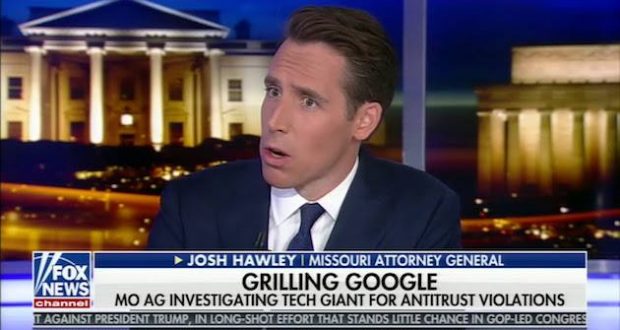Missouri Attorney General Josh Hawley is receiving national attention. In November, Hawley subpoenaed Google owner Alphabet, as part of an investigation into its possible violations of Missouri antitrust and consumer protection law. If the suit moves forward, other states could join in with their own suits, bringing the liberal behemoth, with its desires to dominate the world, to its knees. Bloomberg reports the story here:
The command center for the war against the world’s second-most valuable company is a modest office in Jefferson City, Mo., population 43,000. Josh Hawley, the state’s attorney general, has decorated the room with reminders of his family and some more political keepsakes, including a portrait of Ronald Reagan and a copy of Barry Goldwater’s Conscience of a Conservative. On the far side of the office, along an otherwise empty wall, is a crate labeled “STUFF,” full of toys intended to occupy Hawley’s two preschool-age sons during their frequent visits. “They’re kind of loud,” he says. “I’m not sure that their presence is entirely welcomed by everyone in the building.”
Hawley, a 38-year-old Yale Law School graduate with Ken doll looks and Federalist Society bona fides, has spent his 14 months in office pursuing cases that seem designed to attract attention beyond Missouri’s borders. Alphabet Inc., Google’s parent, is his biggest target yet. The company owes its market value of more than $750 billion to its overwhelming share of global internet searches—more than 90 percent, according to analyst Statcounter. In November, Hawley subpoenaed Alphabet as part of an investigation into its possible violations of Missouri antitrust and consumer protection law.
Hawley may have other motivations to take up a similar crusade in the U.S. On Feb. 27 the Missouri attorney general formally launched a campaign for the U.S. Senate. He’s running as the favorite to win the Republican nomination in what is arguably the most important race in the 2018 midterm elections. If he can unseat Claire McCaskill, a two-termer who is one of the most vulnerable Democratic senators up for reelection, Republicans will likely maintain control of the Senate. In that case, Hawley would have a prominent platform to criticize Silicon Valley at a moment when the public has become much more skeptical of Big Tech. “We need to have a conversation in Missouri, and as a country, about the concentration of economic power,” he says.
Lawyers on Hawley’s staff are still considering the evidence, and he says he’ll make a decision on whether to bring charges this summer—when his Senate campaign will be in full swing. A person familiar with the case says several other states are considering similar investigations. This would strengthen Hawley’s critique of Google and ensure that it remains in the national press.
Google, which says it’s cooperating with Hawley’s investigation, dismisses it as an attempt to revive a long-discredited attack. “We have strong privacy protections in place for our users, and we continue to operate in a highly competitive environment,” spokesman Patrick Lenihan said in a statement.
The atmosphere is more ominous for Silicon Valley than at any time in recent memory. Big Tech scares people who worry about privacy, robots taking their jobs, and the mental development of their smartphone-toting children. Liberals have criticized tech companies for being insufficiently vigilant in combating hoaxes and online harassment. When platforms such as YouTube, Facebook, and Twitter have attempted to respond, Republicans have complained about a clampdown on conservative speech by liberal-leaning companies based in California. Last year, Ajit Pai, head of the Federal Communications Commission, cited the censorious nature of tech companies as a reason to revoke net neutrality.
Although it’s unusual for Republicans to argue for greater government intervention in the market, Hawley says the tech industry’s unchecked power shows how the interests of Big Government and Big Business can bring out the worst tendencies in each. “The Obama administration was not eager to take a close look at the behavior of some of these tech companies, particularly those that were ideologically aligned,” he says. “My worry is, to be frank with you, that we’re drifting towards a form of corporatism.”
No serious legal expert thinks Hawley and his modest team will be able to prosecute Google successfully on their own. But an antitrust lawsuit doesn’t have to be a winner to be damaging, says Geoffrey Manne, executive director of the International Center for Law and Economics, a nonprofit think tank. In addition to an FTC investigation, Microsoft Corp. faced a series of lawsuits brought by ambitious state attorneys general. A federal judge in 2000 ordered that the company be broken up, but it negotiated a settlement during the appeals process that required it merely to make its software development tools available to other businesses.
Microsoft was eventually outmaneuvered in the online market by smaller companies—most notably Google and Facebook Inc., which came to dominate internet services and social media. Manne, who worked at Microsoft in the mid-2000s, attributes its fall from supremacy partly to a sense of caution that the company developed during its years of bruising litigation. “It doesn’t even matter if you’re found liable,” he says. “It can still have a big effect. If Google isn’t fearful, they should be.”
Like Microsoft in its heyday, Google runs an utterly dominant tech service while also developing products to compete directly with companies that rely on it. Starting in the mid-2000s, Google began deemphasizing “organic” search results (lists of links to web pages ranked by perceived relevance) and instead started offering the information users often wanted on the search page itself (restaurant reviews, famous people’s heights, the population of Akron). That meant less web traffic for some competitors. The practice attracted the FTC’s attention in the early years of the Obama administration, but instead of bringing a lawsuit, the commission reached a settlement with Google in 2012 allowing websites to opt out of having their material presented directly on Google’s pages.
In 2015, however, the FTC inadvertently revealed that it had considered taking a more aggressive stance. A commission official accidentally sent Wall Street Journal reporters sections of an internal report claiming that Google appropriated content from competitors to improve its own search rankings and had threatened to punish anyone who complained. According to the internal FTC report, Google put restrictions on companies that sought to work with competing search engines and prevented advertisers from using Google data to improve their ad campaigns elsewhere. Taken together, the allegations illustrated how a company with a search monopoly could throw its weight around in other areas. The leaked report recommended a lawsuit, but the FTC’s commissioners decided not to pursue one. (The commission later said Google had addressed the practices in question.) The EU verdict and a more recent one in which Indian authorities fined Google $21 million for anticompetitive behavior show that wasn’t the last word.
Hawley would face tough odds in U.S. courts. For decades, federal judges have held that monopolies are bad only if they end up causing quantifiable consumer harm, which usually means higher prices. Google’s search engine, like most of its products, is free. EU law, on the other hand, takes a broader view of what counts as harm. “It can’t be emphasized enough that Europe has a completely different standard,” Trish Conners, Florida’s deputy attorney general, said at a conference for state prosecutors soon after the EU verdict. The U.S., she said, “hasn’t kept up with the times.”
A similar interpretation has become popular in certain left-wing circles, part of a movement critics refer to as “hipster antitrust.” At times, Hawley’s arguments on the matter echo liberal groups like the Open Markets Institute, which views market concentration as harmful in and of itself. Google’s defenders say a focus on market competitiveness unduly privileges weaker companies that should be left to fail and that some of the biggest advocates for antitrust litigation against Google are other tech giants. In February, Politico reported that FairSearch, ostensibly a consumer protection organization, is controlled by Oracle Corp. and South African media conglomerate Naspers Ltd. Hawley’s inquiry hews closely to long-running complaints from local listings site Yelp Inc., which has lobbied states to bring antitrust cases against Google. And one of Hawley’s biggest campaign donors has been Peter Thiel, the venture capitalist and conservative bomb-thrower who’s criticized Google’s concentrated power.
Hawley denies carrying water for Google’s enemies, and some antitrust experts say his theory is credible. “It’s a solid case, and I’m glad someone’s pursuing it,” says Chris Sagers, a law professor at Cleveland State University.
The attorney general’s advisers say his crusade against Google could also be key to sending him to Washington. Brad Todd, a consultant for Hawley, says Missouri’s electorate consists of three groups: Democrats, Republicans, and populists. “Whoever wins the populists wins the election,” he says, and campaigning against a powerful out-of-state corporation is a classic populist move. “If it’s really big, it’s not presumed to be acting in the interests of Middle America,” Todd says. “That’s a good start.”
An investigation that lands Hawley in Washington could motivate him to take further action. While a first-term senator likely wouldn’t have the power to organize a federal crackdown on the tech industry, he says one of his priorities would be to figure out just how much he could do on that front. “The Senate has significant investigative powers. They don’t often use them, at least in a way that’s constructive for anything,” Hawley says. “They should be doing exactly what we’re doing here in Missouri.”
–By J O S H U A B R U S T E I N | BLOOMBERG
 Metro Voice News Celebrating Faith, Family & Community
Metro Voice News Celebrating Faith, Family & Community 








